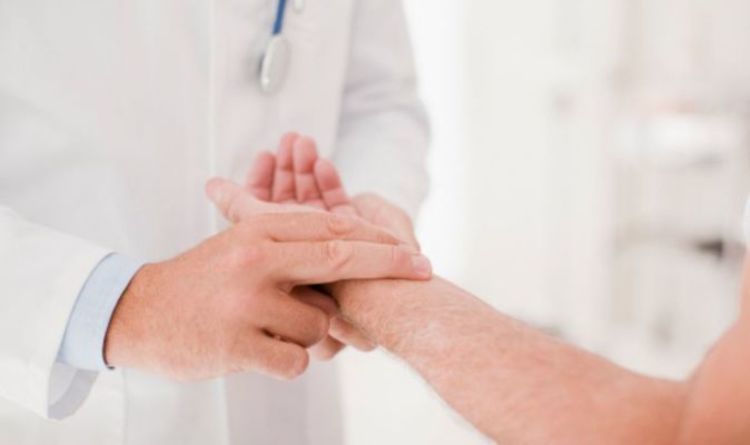Pulse oximeter: Dr Amir Khan explains how device works
We use your sign-up to provide content in ways you’ve consented to and to improve our understanding of you. This may include adverts from us and 3rd parties based on our understanding. You can unsubscribe at any time. More info
Your heart rate is a measurement of the number of times per minute that your heart contracts or beats. Monitoring your heart rate is useful for tracking fitness and managing the risk factors of heart and circulatory diseases like diabetes. So, how do you measure your heart rate and what is a healthy heart rate?
Most people don’t acknowledge their pulse until it feels too fast or slow, but it’s important to check your pulse rate on a regular basis to ensure you don’t have an irregular heart rhythm.
This is particularly important if you’re over the age of 65, even if you feel well.
Measuring your heart rate is very simple and you can do it manually or with a heart rate monitor.
To check your pulse at your wrist, touch two fingers to the area between the bone and tendon on the thumb side of your wrist.
Count the number of pulses you feel in 15 seconds and multiply this number by four to get your beats per minute.
Do this while seated and rested to get your resting heart rate and after exercise to get an indication of your fitness level.


What should your heart rate be?
Your heart rate will vary depending on when it’s measured and what you were doing before the reading, but in general a normal heart rate is between 60 and 100bpm while you’re resting.
In general, the fitter you are the lower the resting heart rate.
The NHS site explains: “For example, athletes may have a resting heart rate of 40 to 60bpm, or lower.
“See a GP to get checked if you think your heart rate is continuously above 120bpm or below 60bpm, although it may simply be that this is normal for you.”

Anything less than 60pbm is a low heart rate, which is also known as sinus bradycardia.
According to the British Health Foundation, for some people such as athletes, bradycardia doesn’t pose a health risk.
However, if you have a low heart rate and are experiencing symptoms like fainting, fatigue and dizziness then you should make an appointment with your GP.
Sinus tachycardia is the name for a pulse that beats regularly but faster than 90bpm.
It happens when your body sends out electrical signals to make your heart beat faster, and it can be a result of hard exercise, anxiety, certain drugs or a fever.
You’re at a higher risk of having this problem if you have diabetes, heart disease, anaemia, high blood pressure or any other condition that puts a strain on the heart.
Sinus tachycardia isn’t to be taken lightly as complications can lead to blood clots, heart attacks, strokes, heart failure, loss of consciousness or sudden death.
Always see a doctor if your resting pulse is higher than 90bpm and treat any symptoms it comes with such as fainting, dizziness, headaches, chest pain, anxiety and inability to exercise as an emergency.

Does heart rate change with age?
Ageing causes changes to the heart and blood vessels, but your heart rate shouldn’t change significantly with normal ageing.
Your heart can’t beat as fast during physical activity or stressful situations when you’re older, but your heart rate shouldn’t be much higher or lower than the average. If anything your heart rate might be slightly lower as you age.
WebMD explains: “Your heart is a muscle, so over time it can weaken. If you become less active as you age, your heart’s left ventricle becomes stiffer. This means that less oxygen-rich blood is being pumped out to your body.
“An older heart rests at a lower heart rate compared to when you were younger. This means that your heart rate doesn’t increase as much during exercise. This can lead to thicker artery walls and less elastic tissue in them.
“As a result of this, your blood pressure does not stabilize as quickly. Do you feel dizzy or faint when you stand up too quickly? These can be signs that your heart is changing.”
According to the American Heart Association, your heart should beat at around the following rates for each age group:
- Aged 20 – 100-170 bpm
- Aged 30 – 95-162 bpm
- Aged 40 – 90-153 bpm
- Aged 50 – 85-145 bpm
- Aged 60 – 80-136 bpm
- Aged 70 – 75-128 bpm
Source: Read Full Article
